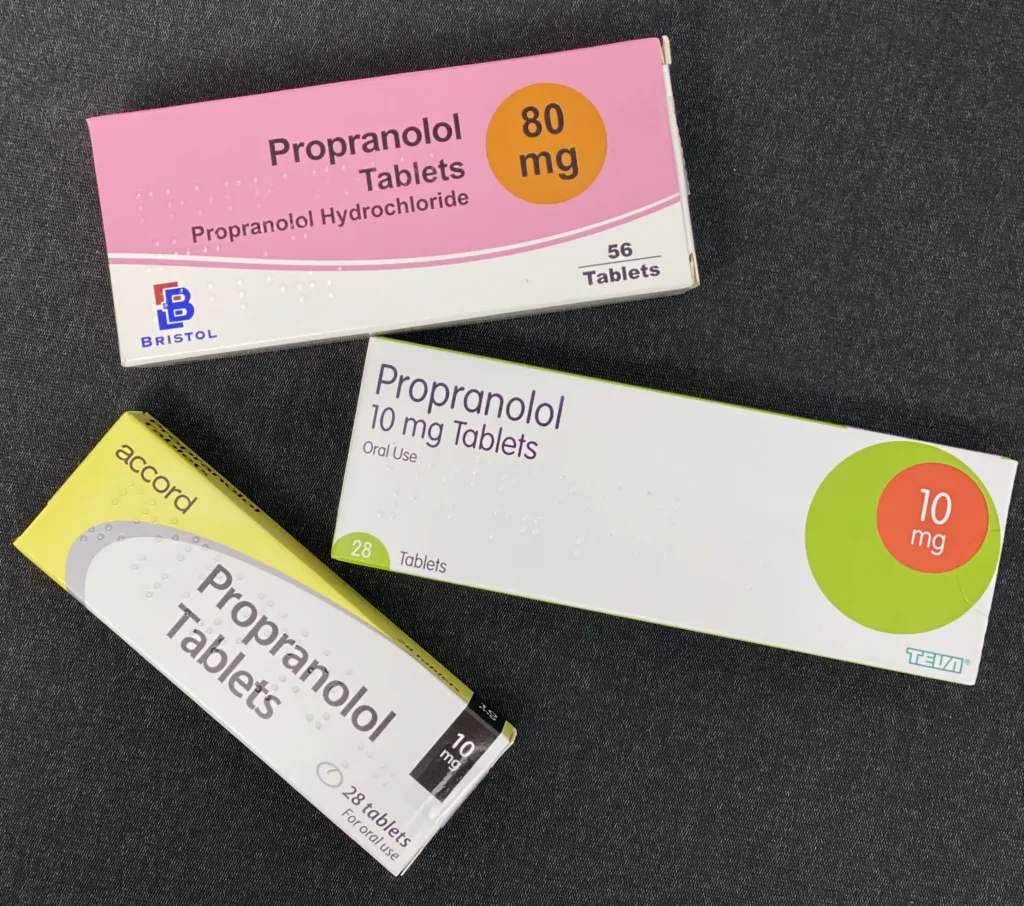Propranolol is a medication that belongs to the class of drugs known as beta blockers. It is commonly used to treat high blood pressure, angina, and certain heart rhythm disorders. However, many people who take propranolol have reported experiencing weight gain as a side effect. In this blog post, we will discuss the relationship between propranolol and weight gain.
Firstly, it is important to note that weight gain is not a common side effect of taking propranolol. In fact, the average weight gain reported by those who have experienced this side effect is only about 2.6 pounds (1.2 kilograms). However, for those who do experience weight gain, it can be frustrating and concerning.
It is not entirely clear why some people experience weight gain whle taking propranolol. One theory is that the medication may slow down the metabolism, leading to fewer calories being burned and an increase in weight. In a study conducted on healthy men, it was found that propranolol reduced resting metabolic rate (RMR) by an average of 9% after just one week of treatment.
Another theory is that propranolol may increase appetite and cravings for high-calorie foods. This can lead to an increase in calorie intake and subsequently, weight gain. It is also possible that propranolol may cause fluid retention, which can contribute to weight gain.
If you are concerned about weight gain while taking propranolol, it is important to speak with your doctor. They may be able to suggest alternative medications or lifestyle changes that can help prevent weight gain. It is also important to maintain a healthy diet and exercise regularly to help control weight.
While weight gain is not a common side effect of taking propranolol, it is a possibility. It is important to speak with your doctor if you are concerned about this side effect or experiencing any other symptoms while taking this medication. With proper management and lifestyle changes, weight gain can be prevented or controlled.
Effects of Propranolol on Weight Gain
Propranolol is a beta blocker medication that is commonly used to treat high blood pressure, migraines, and anxiety. One of the potential side effects of propranolol is weight gain. The amount of weight gain can vary from person to person, but the average reported weight gain on propranolol is about 2.6 pounds (1.2 kilograms). However, it is important to note that weight gain is not experienced by everone who takes propranolol and the degree of weight gain can depend on factors such as dosage, duration of use, and individual differences in metabolism. If you are concerned about weight gain while taking propranolol, it is important to speak with your healthcare provider to discuss potential options and strategies for managing this side effect.

Source: goodrx.com
Effects of Propranolol on Weight Gain
Propranolol is a medication that is primarily used to treat high blood pressure, angina, and irregular heartbeats. While weight gain is not a commonly reported side effect of taking propranolol, some people have reported gaining weight, esecially in the first few months of taking the medication. It is not yet clear why this happens, but some researchers suggest that it may be related to changes in metabolism or appetite. However, it is important to note that weight gain is not a guaranteed side effect of taking propranolol and that the benefits of the medication often outweigh any potential risks. If you are concerned about weight gain while taking propranolol, it is best to speak with your healthcare provider to discuss any potential concerns and to explore alternative treatment options if necessary.
Common Side Effects of Propranolol
Propranolol is a medication that is commonly used to treat various medical conditions such as high blood pressure, migraines, and anxiety. However, like any medication, propranolol may cause some side effects. The most common side effects of propranolol include dizziness or lightheadedness, tiredness, diarrhea, and constipation. These side effects are typically mild and should go away on their own over time. However, if you experience any severe or persistent symptoms while taking propranolol, it is important to speak with your doctor. Your doctor may adjust your dosage or switch you to a different medication to help manage your symptoms.
The Impact of Propranolol on Metabolism
Yes, propranolol has been shown to affect metabolism. In a previous study, it was found that 1 week of propranolol treatment (160 to 240 mg/d, orally) reduced resting metabolic rate (RMR) an average of 9% in healthy men. RMR refers to the energy that the body uses to function at rest, such as breathing and maintaining body temperature. The reduction in RMR suggests that propranolol may decrease the body’s ability to burn calories at rest, which could potentially lead to weight gain. However, it is important to note that the effects of propranolol on metabolism may vary depending on factors such as dosage, duration of treatment, and individual differences in metabolism. It is alwas recommended to consult a healthcare professional for personalized advice on medication use and potential side effects.
The Effects of Propranolol on Belly Fat
Propranolol is a beta-blocker medication that is commonly used to treat high blood pressure, angina, and other cardiovascular conditions. While weight gain is a known side effect of this medication, it is not typically associated with belly fat specifically.
The exact mechanism by which propranolol causes weight gain is not entirely clear. However, it is thought to be related to the medication’s effects on the body’s metabolism. Propranolol has been shown to reduce the body’s ability to burn fat, which can lead to weight gain over time.
Weight gain associated with propranolol use is usually modest, typically less than 5 pounds. However, it can vary depending on the individual and the dosage of the medication. Additionally, weight gain is not the only side effect of propranolol, and individuals taking this medication sould be aware of other potential risks and side effects.
Overall, while propranolol may contribute to weight gain, it is not typically associated with belly fat specifically. If you have concerns about weight gain or other side effects associated with propranolol use, it is important to discuss these concerns with your healthcare provider.

Source: theindependentpharmacy.co.uk
The Effects of Propranolol on Weight Loss
Propranolol, a medication used to treat high blood pressure, irregular heartbeats, and migraines, may cause a small amount of weight loss in some people. However, it is not primarily prescribed for weight loss purposes, and any weight loss associated with propranolol is usally modest, up to a pound or so. In fact, some people may even experience weight gain while taking propranolol. It’s important to note that the effects of medications like propranolol on weight can vary widely from person to person and are influenced by many factors, including diet, exercise, genetics, and individual metabolism. Therefore, if you are considering using propranolol for weight loss, it’s essential to talk to your healthcare provider first to determine if it’s an appropriate treatment option for you.
Preventing Weight Gain While Taking Propranolol
Propranolol is a medication used to treat high blood pressure, angina, and other heart-related conditions. One of the common side effects of this medication is weight gain. However, there are ways to stop weight gain while taking propranolol.
Firstly, it is important to talk to your doctor about your concerns and ask if there are alternative medications that could be used. If not, your doctor may recommend lowering your dosage or changing the time of day you take the medication.
Additionally, it is important to limit portion sizes and choose healthy, low-calorie foods. Eating more protein can also help you feel full and reduce cravings. It is best to talk to a dietitian to create a personalized meal plan that fits your needs.
Exercise is also an effective way to prevent weight gain. Aim for at least 30 minutes of moderate-intensity exercise most days of the week. This can include walking, biking, or swimming.
Avoiding alcohol is also important as it can add extra calories and interfere with the effectiveness of the medication. Lastly, getting eough sleep is crucial for overall health and weight management.
In summary, stopping weight gain on propranolol involves a combination of medication management, healthy eating habits, regular exercise, and good sleep hygiene. It is important to work with your doctor and a dietitian to create a personalized plan that fits your needs.
Avoiding Weight Gain While Taking Beta Blockers
Beta-blockers are commonly prescribed medications for high blood pressure, but they can make it more difficult for people to manage their weight, as they can slow down the metabolism and reduce energy levels. However, there are ways to avoid weight gain while taking beta-blockers. Here are some tips to help you manage your weight:
1. Follow a healthy diet: Eating a well-balanced and nutritious diet is crucial to maintaining a healthy weight. Avoid processed and high-fat foods, and instead, focus on whole grains, fruits, vegetables, lean protein, and healthy fats.
2. Exercise regularly: Regular exercise can help you burn calories and maintain a healthy weight. Aim for at least 30 minutes of moderate-intensity exercise, such as brisk walking, cycling, or swimming, most days of the week.
3. Get enough sleep: Getting enough restful sleep is important for maintaining a healthy weight. Lack of sleep can lead to overeating and weight gain, so aim for 7-8 hours of sleep each night.
4. Monitor your weight: Keep track of your weight regularly, and if you notice any changes, adjust your diet and exercise habits accordingly.
5. Talk to your doctor: If you’re concerned about weight gain while taking beta-blockers, talk to your doctor. They may be able to adjust your medication or provide additional guidance on how to manage your weight.
In summary, maintaining a healthy weight while taking beta-blockers requires a combination of healthy eating habits, regular exercise, good sleep hygiene, monitoring your weight, and communicating with your doctor. By following these tips, you can keep your weight undr control and maintain good overall health.
Avoiding Potential Side Effects of Propranolol
When taking propranolol, it is important to avoid breaking, chewing, crushing, or opening the extended-release capsules. This medication should be taken at bedtime, ideally around 10 pm. You may take propranolol with or without food, but it is important to take it the same way each time. It is also important to avoid alcohol consumption while taking propranolol, as it may increase the side effects of the medication. Additionally, if you have a history of asthma, slow heart rate, or heart block, you should not take propranolol without consulting with your healthcare provider first.

The Optimal Time for Taking Propranolol
The best time of day to take propranolol is at bedtime, specifically at 10 pm. It is recommended to take the extended-release capsules with or without food, but to take it the same way each time. By taking propranolol at the same time every day, it helps to maintain a consistent level of the medication in the body. Additionally, taking propranolol at bedtime may help reduce side effects such as dizziness or fatigue, which can be more noticeable during waking hours. As always, it is important to follow your doctor’s instructions regarding medication dosage and timing.
The Effectiveness of Propranolol in Treating Everyday Anxiety
Propranolol has been shown to be effective in treating the physical symptoms of anxiety, such as increased heart rate, sweating, and trembling. It works by blocking the effects of adrenaline, which is a hormone released during the fight or flight response.
A doctor may prescribe propranolol for daily use to manage anxiety symptoms. However, it is important to note that propranolol does not address the underlying causes of anxiety and should not be used as a long-term solution.
It is also important to follow the doctor’s instructions rgarding dosage and frequency of use. Abruptly stopping propranolol can lead to withdrawal symptoms, including increased anxiety, so it should be tapered off gradually if the doctor recommends discontinuing it.
Overall, propranolol can be an effective tool in managing anxiety symptoms when used as part of a comprehensive treatment plan that includes therapy and lifestyle changes.
Consequences of Discontinuing Propranolol
When you stop taking propranolol suddenly, it can case a range of side effects that might be severe. Propranolol is a medication that is used to treat high blood pressure, heart conditions, and anxiety. It works by reducing the workload on the heart and lowering blood pressure. When you stop taking propranolol, your body may experience withdrawal symptoms such as sweating, shaking, and an irregular heartbeat. These symptoms can be severe, and in some cases, they can even be life-threatening. It is important to seek medical attention if you want to stop taking propranolol or if you are experiencing any of these symptoms. Your doctor may recommend gradually reducing your dose of propranolol to help avoid these side effects. Overall, it is essential to follow your doctor’s instructions when taking or stopping propranolol to ensure your safety and well-being.
The Effects of Beta Blockers on Weight Gain
Beta blockers can cause weight gain due to various reasons. Firstly, they can slow down your metabolism, which means your body burns fewer calories than it normally would. This can lead to weight gain over time, especially if you continue to eat the same amount of food as before. Secondly, if you switch from taking a water pill to a beta blocker as a treatment for high blood pressure, you may gain a few pounds of weight that the diuretic kept off. This is because water pills help you lose excess fluids and sodium from your body, which can cause a temporary drop in weight. When you switch to a beta blocker, your body may retain more fluids and sodium, leading to weight gain. Lastly, beta blockers can also increase your appetite, causing you to eat more and gain weight. However, it’s important to note that not everone who takes beta blockers will experience weight gain, and the amount of weight gain may vary from person to person.
The Effects of Propranolol on Hormones
Yes, propranolol can affect hormones. Studies have shown that propranolol can significantly reduce levels of follicle stimulating hormone and testosterone, which are important hormones for reproductive function. Additionally, propranolol has been found to increase levels of cortisol, a hormone that is involved in the body’s stress response. However, propranolol does not apear to have an effect on other hormones studied, such as luteinizing hormone, prolactin, or thyroid hormones. It is important to note that the specific effects of propranolol on hormones may vary depending on the individual and the dose of medication used. It is always recommended to consult with a healthcare provider before starting or making any changes to medication regimens.

Long-Term Effects of Propranolol
Yes, propranolol can have long-term effects. Propranolol is a medication that belongs to a class of drugs called beta-blockers, which work by blocking the effects of the hormone adrenaline on the body. While propranolol can be an effective treatment for a variety of conditions, such as high blood pressure, anxiety, and migraines, it can have some potential long-term effects.
One of the most significant long-term effects of propranolol is its potential to mask symptoms of low blood sugar in people with diabetes. This can be dangerous because low blood sugar can be life-threatening if not treated promptly. People with diabetes who take propranolol should be aware of this potential side effect and monitor their blood sugar levels closely.
Another potential long-term effect of propranolol is that high doses taken over an extended period of time can worsen heart problems and cause irregular heart rates. This is because propranolol can slow down the heart rate, which can be helpful in some cases, but can also be harmful if the heart is already weak or damaged.
Therefore, it is essential to consult with a doctor or healthcare professional before taking propranolol, especially if you have a history of heart problems or diabetes. They can help you determine if propranolol is an appropriate treatment option for you and monitor any potential long-term effects that may arise.
Conclusion
In conclusion, Propranolol is a medication that belongs to the class of beta blockers and is commonly used to treat various conditions such as high blood pressure, irregular heartbeats, and migraines. While it is generally well-tolerated, some people may experience side effects such as dizziness, tiredness, diarrhea, and constipation.
Weight gain is a potential side effect of Propranolol, with an average gain of 2.6 pounds. However, it is not a common side effect and not enough information is available to explain why some people experience this. Additionally, research has shown that Propranolol may reduce resting metabolic rate by an average of 9% in healthy men.
It is essential to talk to your doctor about any potential side effects before starting Propranolol, and to report any symptoms that may occur dring treatment. Overall, Propranolol can be an effective medication for managing certain health conditions, but it should be used under the guidance of a healthcare professional.
